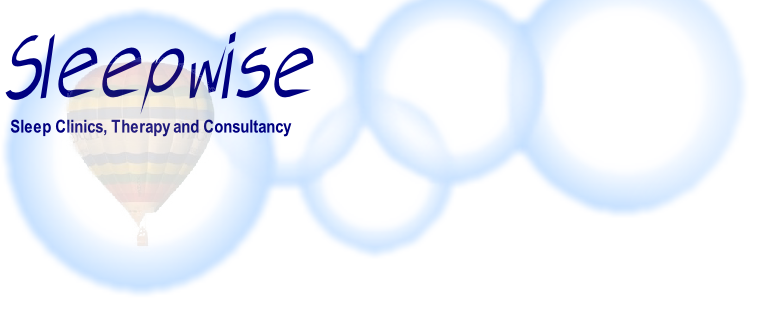

Sleepwise Sleep Clinics and Therapy
Sleepwise provides professional sleep therapy services and advice, including clinics, one-

Sleep & Stress
Consultants
since
1999




Sleepwise Sleep Clinics and Therapy
Sleepwise provides professional sleep therapy services and advice, including clinics, one-

ACUPUNCTURE FOR THE TREATMENT OF INSOMNIA
Submitted by Sleepwise Associate Tiziana Bertinotti
Insomnia and sleep disorders are on the increase. The proverbial good night's sleep seems more elusive than ever. Many people are facing many sleepless nights.
Chinese Medicine recognizes the importance of adequate sleep for physical, psychological, and spiritual well -
Acupuncture involves the insertion of very fine needles into specific points on the surface of the body. These points lie along the energy conduits of Qi flow (vital energy) also called "Channels" or "Meridians". With acupuncture, the points are stimulated, and flow "unblocked", producing beneficial physical and emotional changes in the body.
Sleep is critical to maintain Qi and to maintain good health. Lack of sleep causes the body to overproduce "stress hormones" such as adrenaline and cortisol, which cause people to be nervous and more aggressive. Increased levels of cortisol due to chronic stress are also linked to high blood pressure, suppressed immune system and weight gain. Not enough sleep leads to poor job performance, impaired judgment, and serious accidents when driving or operating machinery.
From a Western medical point of view, Acupuncture decreases the production of stress hormones, while increasing the night-
During my treatments, I take a detailed history, which includes questioning, pulse analysis and tongue diagnosis. Even if I determine that two different patients have insomnia, their treatments may still be different, depending on each person's constitution (strength and type of overall body and health) and other factors, such as diet, lifestyle, and emotions. One of the key ingredients in treating insomnia is to ask specific questions as to what causes it. I am trained to find out why a patient has insomnia, what's going on in his/her body that's causing it, and why the flow of energy is not working properly. Each form of insomnia has many variations on the theme as there are people who suffer from it.
This is what makes acupuncture so individualized and effective: there is no one prescription for a condition. Each time a patient comes in, I re-
What You Can Expect
Most of my patients report feeling extremely relaxed at the end of even just the very first acupuncture treatment. This can be a great relief if someone has not had a good night's sleep for a while, as the body will tend to be full of tension even when resting. Consequently, people often sleep very well the night after treatment, but this doesn't mean the problem is solved.
Because insomnia is usually a chronic problem, several treatments are likely to be needed in order to enable the body to readjust properly. These should be received a couple of times a week over the course of one to two months. Please note that it is important to complete the course of treatments that I recommend in order to see and feel results. Each acupuncture treatment builds on the previous one, so it is vital not to stop after only one or two treatments. The principle is the same as when taking antibiotics: for proper therapeutic results, we must complete their course, and not just take one or two doses.
As the condition improves and the patient starts sleeping better, treatments are spaced farther apart, say every two, and later three weeks, or monthly. Once the condition has resolved, people may still choose to continue treatment for maintenance and preventative care. These maintenance visits can be monthly or quarterly, depending on people's health goals.
Sleep disturbances sometimes require a combination of approaches. This is why, in addition to acupuncture, I work closely with Sleepwise in order to provide a list of lifestyle changes that may be needed as well to treat insomnia.
I have compiled a comprehensive list of Frequently Asked Questions that explain how acupuncture works, what it can treat, what to expect from a treatment, and much more. Please click onto the following link for further details:
http://www.millersyard.co.uk/therapies/id124/acupuncture.html
Alternative, you may visit my website www.yorktraditionalacupuncture.co.uk
Scientific evidence
There is plenty of scientific evidence that shows the effectiveness of acupuncture in the treatment of insomnia and other sleep-
Here are a few citations for research:
ACUPUNCTURE BETTER THAN PILLS FOR INSOMNIA
________________________________________
A systematic review of studies of acupuncture for insomnia, including papers published in both English and Chinese, has been carried out by researchers in Hong Kong. Twenty RCTs met the inclusion criteria. The majority of RCTs concluded that traditional needle acupuncture (TNA) was significantly more effective than benzodiazepines for treating insomnia, with mean effective rates for acupuncture and benzodiazepines being 91% and 75%, respectively. TNA also appeared to be better at improving sleep than sleep hygiene counselling and sham acupuncture. Standardised and individualised acupuncture were found to have similar effective rates. (Traditional needle acupuncture treatment for insomnia: A systematic review of randomized controlled trials. Sleep Med. 2009 Mar 18. [Epub ahead of print]).
ACUPUNCTURE FOR INSOMNIA
________________________________________
A randomised single-
AURICULAR ACUPUNCTURE EFFECTIVE FOR INSOMNIA
________________________________________
A systematic review of current literature conducted by authors from Hong Kong has concluded that auricular acupuncture appears to be effective for treating insomnia. Eight hundred and seventy eight (878) papers were searched of which only six trials (402 people treated with AA among 673 total participants) were deemed of high enough methodological quality to meet the inclusion criteria. The recovery and improvement rates produced by AA were found to be significantly higher than those of diazepam. The efficacy of using Semen vaccariae ear seeds was better than that of controls while use of magnetic beads did not show statistical significance. Six commonly used auricular acupoints were Shenmen (100%), Heart (83.33%), Occiput (66.67%), Subcortex (50%), Brain and Kidney (each 33.33%, respectively). The authors recommend that further, better-
ACUPUNCTURE, INSOMNIA & MELATONIN
________________________________________
In a study of 18 anxious subjects, five weeks of acupuncture treatment was associated with significant improvements in a variety of sleep determinants (polysomnographic measures of sleep onset latency, arousal index, total sleep time and sleep efficiency), reduction in anxiety and nocturnal increase in endogenous melatonin secretion. (J Neuropsychiatry Clin Neurosci. 2004 Winter;16(1):19-
ACUPUNCTURE APPEARS TO BE EFFECTIVE IN TREATMENT OF INSOMNIA
________________________________________
Acupuncture appears to be effective in the treatment of insomnia according to a systematic review and meta-

Tiziana Bertinotti
BHSc (Acupuncture), BA (Hons),
PGCE,
Post-
Diploma of Bowen Therapy (Bowtech)